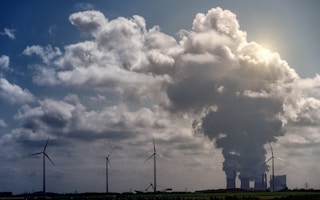Oversea-Chinese Banking Corporation (OCBC), Southeast Asia’s second largest bank, has dropped out of the last coal financing project that it is involved in, Eco-Business can reveal.
To continue reading, subscribe to Eco‑Business.
There's something for everyone. We offer a range of subscription plans.
- Access our stories and receive our Insights Weekly newsletter with the free EB Member plan.
- Unlock unlimited access to our content and archive with EB Circle.
- Publish your content with EB Premium.
The move away from a financing collective for the 1,200-megawatt Vung Ang 2 coal-fired power station in Vietnam marks a major strategic rethink for the Singapore-based financial services firm, which in January 2018 was identified as Southeast Asia’s largest backer of coal projects in recent years.
Sources close to the Vung Ang 2 project confirmed that the bank dropped out during the early stages, when discussions were underway to form the financing collective.
In April, OCBC chief executive Samuel Tsien announced that it would back away from new coal financing, but the bank still had two projects in play. After the Van Phong 1 coal project in Vietnam reached financial close in August, that left only Vung Ang 2 that OCBC was involved in.
“OCBCs decision to withdraw from the funding consortium for Vung Ang 2, one of the most controversial coal projects in Asia, shows what it really means to implement a coal policy and stick to it,” commented Julien Vincent, head of non-governmental organisation Market Forces, which has been campaigning for banks to quit coal in Southeast Asia.
“While OCBC is walking the talk, other banks such as DBS Bank and Standard Chartered Bank, which have also promised to stop funding coal, remain involved in new coal projects, making a mockery of the policies they have only just introduced,” he said.
Singapore-based DBS announced it would quit coal two days after OCBC in April, but the bank continues to support coal projects such as Vung Ang 2 and has said it will only stop coal funding by 2021, once existing deals have been completed.
United Kingdom-headquartered Standard Chartered said it would stop financing new coal projects in September last year, and pulled out of the financing consortium for the Nghi Son 2 coal plant in Vietnam five months prior. But the bank is still involved in Vung Ang 2 and the 1,980 MW Vinh Tan 3 project, also in Vietnam, according to Market Forces data.
In an interview with Eco-Business in April, Maarten Biermans, the head of sustainable capital markets for Dutch bank Rabobank, pointed out that it will get harder for banks to resist coal financing the more of them withdraw—even with the growing risk of stranded assets and the increasing reputational damage that coal financing does to a bank’s brand.
“The last investor to leave the coal business will have the highest opportunity cost,” he said. “The sources of capital [for coal] are getting smaller as more banks exit, meaning that the cost of capital will rise. So the banks that stay in that game the longest will make the most money—and that income will increase as more banks quit coal.”
The number of newly completed coal plants fell by 20 per cent last year, with more than 100 finance institutions worldwide quitting the fossil fuel, the burning of which is the single biggest contributer to man-made greenhouse gas emissions.








